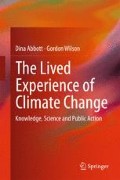Abstract
Classically, scientific approaches to knowledge, and specifically that of climate change, proceed through systematic collection and investigation of empirical data to establish patterns, and controlled experimentation to demonstrate the truth or otherwise of generalisations, such as ‘Human beings are mostly responsible for contemporary climate change’. Scientific approaches also reduce phenomena to their constituent parts, and analyse them independently through subject specialisms, or disciplines, before putting them back together again. Through these controlled processes, science claims to be objective, bringing us closer to reality. Lived experience, on the other hand, proceeds largely through dialectics—the debating of opinions. It is clearly subjective, but nevertheless presents complementary realities. This chapter further argues that (1) Science (natural and social) and lived experiences are each partial versions of reality. The former is limited by the epistemological boundaries that are placed around the subject specialisms that discipline us into certain ways of thinking about phenomena. Lived experience is by definition limited by the practice of everyday life. (2) Science also proceeds through challenge by other scientists of interpretation of empirical results, often starting from different premises. This process is not dissimilar to the dialectics that characterise the process of lived experience. (3) Scientific challenge in relation to climate change is often not neutral or benign. It is seized upon politically to attempt to neutralise the power of scientific evidence in climate change policy debates. (4) The institutionalised perception among scientists themselves that their knowledge is superior, however, leads to significant challenges of working together to generate a more holistic approach to climate change, as illustrated by a personal story of one of the authors.
Access this chapter
Tax calculation will be finalised at checkout
Purchases are for personal use only
References
Blackmore, R. (2009). Climate change: Causes and consequences. In G. Wilson, P. Furniss, & R. Kimbowa (Eds.), Environment, development and sustainability: Perspectives and cases from around the world. Oxford: Oxford University Press.
Breitmeier, H., & Otto, D. (2012). Understanding political processes in climate change negotiations by means of an interdisciplinary curriculum in higher education. International Journal of Innovation and Sustainable Development, 6(1), 20–30.
Dyson, F. (1995). The greenhouse effect: An alternative view. In J. Carey (Ed.), The Faber book of science. London: Faber and Faber Ltd.
European Commission. (2011). A roadmap for moving to a competitive low carbon economy in 2050. http://eur-lex.europa.eu/resource.html?uri=cellar:5db26ecc-ba4e-4de2-ae08-dba649109d18.0002.03/DOC_1&format=PDF. Accessed February 20, 2015.
Francis, J. A., & Vavrus, S. J. (2012). Evidence linking Arctic amplification to extreme weather in mid-latitudes. Geophysical Research Letters, 39(L06801), 2012. doi:10.1029/2012GL051000.
Funtowicz, S., & Ravetz, J. (2013). Post-normal science: Environmental policy under conditions of complexity. NUSAP.net. Available at: http://www.nusap.net/sections.php?op=viewarticle&artid=13. Accessed February 20, 2015.
Giddens, A. (2007). The politics of climate change. Cambridge: Cambridge University Press.
Hajer, M. A. (1995). The politics of environmental discourse. Oxford: Oxford University Press.
Howard, J. (2011). Environmental nasty surprise, post-normal science, and the troubled role of experts in sustainable democratic environmental decision making. Futures, 43, 182–195.
Hulme, M. (2009). Why we disagree about climate change. Cambridge: Cambridge University Press.
IPCC. (2013). Summary for policy makers. In T. F. Stocker, D. Qin, G.-K. Plattner, M. Tignor, S. K. Allen, J. Boschung, A. Nauels, Y. Xia, V. Bex, & P. M. Midgley (Eds.), Climate change 2013: The physical science basis. Contribution of Working Group I to the Fifth Assessment Report of the Intergovernmental Panel on Climate Change. Cambridge, UK: Cambridge University Press.
Leroi, A. M. (2014). The lagoon: How Aristotle invented science. London: Bloomsbury Circus.
Mabey, R. (2013). Turned out nice again: Living with the weather. London: Profile Books Ltd.
Midgley, M. (2014). Are you an illusion?. Durham: Acumen.
Nelkin, D. (1977). The political impact of technical expertise. In G. Boyle, D. Elliott, & R. Roy (Eds.), The politics of technology (pp. 189–205). London: Longman in association with The Open University Press.
Peterson, T. C., Stott, P. A., Herring, S. C., & Hoerling, M. P. (2013). Explaining extreme events of 2012 from a climate perspective. Special Supplement to the Bulletin of the American Meteorological Society, 94(9), 564–565.
Petoukhov, V., Rahmstorf, S., Petri, S., & Schellnhuber, H. J. (2013a). Quasiresonant amplification of planetary waves and recent Northern Hemisphere weather extremes. Proceedings of the National Academy of Sciences of the United States of America, 110(14), 5336–5341. doi:10.1073/pnas.1222000110.
Petoukhov, V., Rahmstorf, S., Petri, S., & Schellnhuber, H. J. (2013b). Reply to Screen and Simmonds: From means to mechanisms. Proceedings of the National Academy of Sciences of the United States of America, 110(26), E2328. doi:10.1073/pnas.1305595110.
Pullan, W., & Bhadeshia, H. (Eds.). (2000). Structure in science and art. Darwin College Lectures. Cambridge: Cambridge University Press.
Screen, J. A., & Simmonds, I. (2013). Caution needed when linking weather extremes to amplified planetary waves. Proceedings of the National Academy of Sciences of the United States of America, 110(26), E2327. doi:10.1073/pnas.1304867110.
Stern, N. (2006). The economics of climate change. Cambridge: Cambridge University Press.
Stern, N. (2010). Blueprint for a safer planet: How we can save the world and create prosperity. London: Vintage Books.
Toulmin, C. (2009). Climate change in Africa. London: Zed Books.
UCAR. (2012). Doping the atmosphere. AtmosNews, February 6. Available online at: http://www2.ucar.edu/atmosnews/attribution/doping-atmosphere. Accessed February 20, 2015.
UK Meteorological Office. (2014). A global perspective on the recent storms and floods in the UK. http://www.metoffice.gov.uk/research/news/2014/uk-storms-and-floods. Accessed February 20, 2015. Contains public sector information licensed under the Open Government Licence v1.0.
Author information
Authors and Affiliations
Corresponding author
Rights and permissions
Copyright information
© 2015 Springer International Publishing Switzerland
About this chapter
Cite this chapter
Abbott, D., Wilson, G. (2015). Lived Experience and Scientific Knowledge of Climate Change. In: The Lived Experience of Climate Change. Springer, Cham. https://doi.org/10.1007/978-3-319-17945-2_3
Download citation
DOI: https://doi.org/10.1007/978-3-319-17945-2_3
Published:
Publisher Name: Springer, Cham
Print ISBN: 978-3-319-17944-5
Online ISBN: 978-3-319-17945-2
eBook Packages: EnergyEnergy (R0)

